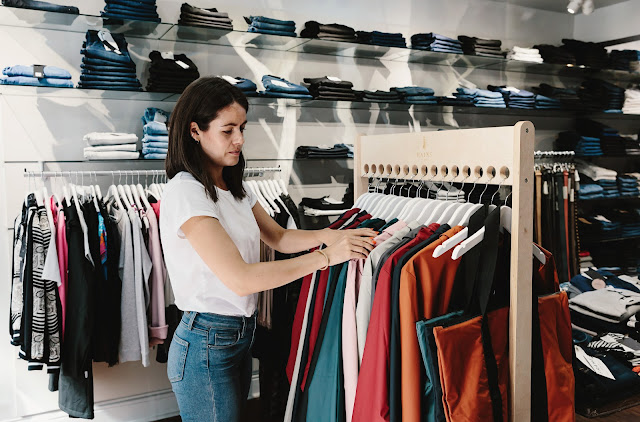Wholesale Boutique Clothing in the UK: A Guide for Retailers
The UK boutique fashion scene is thriving, with shoppers
seeking unique, high-quality pieces that stand out from the mass-produced items
found in mainstream stores. As a boutique owner, curating a distinct and
stylish collection is key to attracting a loyal customer base. Sourcing Wholesale Boutique Clothing in
the UK allows retailers to offer exclusive, trendy garments that fit their
brand's ethos, while maintaining profit margins. This article explores how
UK-based retailers can effectively source boutique clothing from wholesale
suppliers, ensuring a blend of style, quality, and affordability.
What is Wholesale Boutique Clothing?
Wholesale boutique clothing refers to curated, often
limited-edition pieces that are sourced in bulk from manufacturers or
suppliers, but with an emphasis on unique, fashion-forward designs. Unlike
traditional wholesale clothing, which might focus on generic or mass-market
styles, boutique wholesale collections typically cater to niche markets,
offering items that are chic, trendy, or tailored to specific demographics,
such as luxury, bohemian, or eco-conscious fashion.
For UK retailers, stocking wholesale boutique clothing is a
way to stand out in the competitive fashion market, as these garments often
have a handmade or artisanal feel, cater to niche trends, and are available in
smaller quantities to maintain exclusivity.
Why Source Wholesale Boutique Clothing?
Exclusivity and Uniqueness:
Boutique clothing often features limited edition styles,
making it appealing to customers who want to stand out. By sourcing from
boutique wholesalers, retailers can provide fashion-conscious shoppers with
pieces they won’t find in mainstream stores.
Brand Identity:
Boutique retailers typically have a specific aesthetic or
target audience. Sourcing Wholesale
Plus Size Clothing that aligns with your brand allows you to maintain a
cohesive and recognizable identity, which is essential for building brand
loyalty.
High-Quality Materials:
Boutique clothing is often associated with better
craftsmanship and higher-quality materials. Wholesalers catering to boutique
retailers tend to offer garments made from superior fabrics and with more
attention to detail, which elevates the overall perception of your store.
Better Profit Margins:
While boutique items may be priced higher due to their
exclusivity, this often leads to better profit margins for retailers. Consumers
are willing to pay more for high-quality, unique pieces, allowing boutiques to
price their collections more competitively.
Factors to Consider When Sourcing Wholesale Boutique Clothing
Supplier Reputation:
When sourcing boutique clothing, the reputation of the
supplier is paramount. Ensure that the supplier you choose is reliable,
consistent with their stock, and provides good customer service. Reviews and
recommendations from other boutique owners can be invaluable in this regard.
Minimum Order Quantities (MOQ):
Boutique wholesalers often have higher minimum order
quantities, especially for exclusive, limited-edition items. Make sure to
choose a supplier with MOQs that fit your budget and inventory needs.
Quality vs. Price:
Boutique clothing tends to be more expensive than standard
wholesale fashion due to the materials, craftsmanship, and exclusivity
involved. While sourcing, ensure that the price reflects the quality, and
consider how much your customers will be willing to pay for the elevated items
in your store.
Trends and Customer Preferences:
While staying on trend is important, it’s equally crucial to
know your target market’s preferences. Boutique customers often look for
timeless or unique pieces rather than fast fashion. Make sure the clothing you
source aligns with your customers’ style and lifestyle.
Sustainability and Ethical Practices:
Increasingly, consumers are looking for ethically-made,
sustainable clothing. Many boutique wholesalers now offer eco-friendly
collections, using materials such as organic cotton, linen, or recycled
fabrics. Consider incorporating sustainable boutique clothing into your
inventory to appeal to the environmentally-conscious market.
How to Successfully Market Boutique Clothing
Once you’ve sourced your boutique clothing, the key to
success lies in how you market and present it to your customers. Here are a few
strategies to help elevate your boutique:
Curated Collections:
Instead of simply stocking items, create curated collections
that highlight the uniqueness of your pieces. This could be a seasonal
collection, a capsule wardrobe, or a themed lookbook. Customers are more likely
to buy into a well-thought-out collection that tells a story or conveys a
lifestyle.
Highlight Exclusivity:
Make sure your customers know that the pieces you offer are
exclusive or limited edition. Emphasizing the boutique nature of your clothing
can create a sense of urgency, encouraging buyers to make a purchase before the
items are gone.
Leverage Social Media:
Social media platforms, especially Instagram and Pinterest,
are powerful tools for promoting boutique Wholesale Womens Clothing.
Showcase your items through professional photography, influencer partnerships,
and customer-generated content to build a strong online presence.
Host Trunk Shows or Pop-Up Events:
These events offer customers an opportunity to experience
your boutique clothing firsthand, which can lead to better sales and brand
awareness. You can create buzz around new collections or exclusive items,
driving traffic to your store both online and offline.
Conclusion
Sourcing wholesale boutique clothing in the UK allows
retailers to offer unique, high-quality, and exclusive fashion to a discerning
customer base. With a focus on unique designs, superior materials, and ethical
production, boutique clothing is a lucrative avenue for retailers looking to differentiate
themselves in a competitive market. By selecting the right suppliers, staying
in tune with customer preferences, and marketing your offerings effectively,
you can create a thriving boutique business that attracts loyal, fashion-savvy
customers.



Comments
Post a Comment